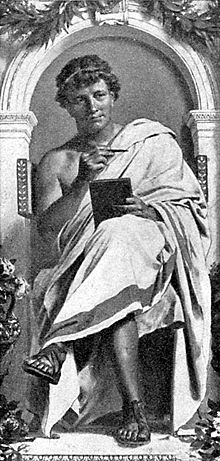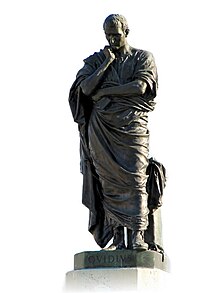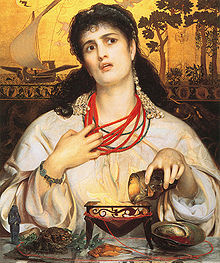Metamorphoses
Appearance


Intrudes on happiness.
The Metamorphoses (Latin: Metamorphoseon libri: "Books of Transformations") is a Latin narrative poem by the Roman poet Ovid, considered his magnum opus. Comprising fifteen books and over 250 myths, the poem chronicles the history of the world from its creation to the deification of Julius Caesar within a loose mythico-historical framework.
One of the most influential works in Western culture, the Metamorphoses has inspired such authors as Dante Alighieri, Giovanni Boccaccio, Geoffrey Chaucer, and William Shakespeare. Numerous episodes from the poem have been depicted in acclaimed works of sculpture, painting, and music.
Quotes
[edit]
With heart and soul, obedient to no law,
Gave honour to good faith and righteousness.

With any herb; the arts which cure the others
Do me, their lord, no good!


a guilty conscience in one's countenance!


Should ever be called happy before burial.




of sunlight, air, and water!


Things that are good, and yet I follow worse ones.


Good people still, and cherishers are cherished.

Is that which conceals art.

and makes indecent what Nature freely allows us!

Without our notice; nothing goes more swiftly
Than do the years.



All things are fluent; every image forms,
Wandering through change.

I trust, beyond Jove's anger, fire and sword,
Beyond Time's hunger.
- Chaos: rudis indigestaque moles.
- Chaos, a raw and undivided mass.
- Book I, line 7 (trans. A. D. Melville)
- Neu regio foret ulla suis animalibus orba,
astra tenent caeleste solum formaeque deorum,
cesserunt nitidis habitandae piscibus undae,
terra feras cepit, volucres agitabilis aer.- And so that every region of the world
should have its own distinctive forms of life,
the constellations and the shapes of gods
occupied the lower part of heaven;
the seas gave shelter to the shining fishes,
earth received beasts, and flighty air, the birds. - Book I, lines 72–75 (trans. C. Martin)
- And so that every region of the world
- Sanctius his animal mentisque capacius altae
deerat adhuc et quod dominari in cetera posset:
natus homo est.- But something else was needed, a finer being,
More capable of mind, a sage, a ruler,
So Man was born. - Book I, lines 76–78 (trans. R. Humphries)
- But something else was needed, a finer being,
- Os homini sublime dedit caelumque videre
iussit et erectos ad sidera tollere vultus.- [God] gave to man a face that is uplifted,
and ordered him to stand erect and look
directly up into the vaulted heavens
and turn his countenance to meet the stars. - Book I, lines 85–86 (trans. C. Martin)
- [God] gave to man a face that is uplifted,
- Aurea prima sata est aetas, quae vindice nullo,
sponte sua, sine lege fidem rectumque colebat.- Golden was that first age which unconstrained,
With heart and soul, obedient to no law,
Gave honour to good faith and righteousness. - Book I, lines 89–90 (trans. A. D. Melville)
- Golden was that first age which unconstrained,
- Amor sceleratus habendi.
- The damned desire of having.
- Book I, line 131 (trans. R. Humphries)
- Effodiuntur opes, inritamenta malorum.
Iamque nocens ferrum ferroque nocentius aurum
prodierat.- ... all that precious metal,
The root of evil. They found the guilt of iron,
And gold, more guilty still. - Book I, lines 140–143 (trans. R. Humphries)
- ... all that precious metal,
- Cuncta prius temptanda, sed inmedicabile curae
ense recidendum, ne pars sincera trahatur.- We have tried everything
to find a cure, but now the surgeon's blade
must cut away what is untreatable,
lest the infection spread to healthy parts. - Book I, lines 190–191 (trans. C. Martin)
- We have tried everything
- Nos duo turba sumus.
- We two are a multitude.
- Book I, line 355
- Ei mihi, quod nullis amor est sanabilis herbis
nec prosunt domino, quae prosunt omnibus, artes!- Alas for me, love is incurable
With any herb; the arts which cure the others
Do me, their lord, no good! - Book I, lines 523–524 (trans. R. Humphries)
- Alas for me, love is incurable
- Pudet haec opprobria nobis
et dici potuisse et non potuisse refelli.- It shames me that I listened to such insults
unable to respond or to refute them! - Book I, lines 758–759 (trans. C. Martin)
- It shames me that I listened to such insults
- Materiam superabat opus.
- Its art surpassed the stuff that it was made of.
- Book II, line 5 (trans. C. Martin)
- Facies non omnibus una,
non diversa tamen, qualem decet esse sororum.- Their features neither utterly alike
nor wholly different, but rather mixed,
as those of sisters ought to be. - Book II, lines 13–14 (trans. C. Martin)
- Their features neither utterly alike
- Medio tutissimus ibis.
- The middle way is safest.
- Book II, line 137 (trans. C. Martin)
- Heu! quam difficile est crimen non prodere vultu!
- How difficult it is not to reveal
a guilty conscience in one's countenance! - Book II, line 447 (trans. C. Martin)
- How difficult it is not to reveal
- Vixque tenet lacrimas, quia nil lacrimabile cernit.
- [Envy]'s scarcely able to prevent herself
from weeping—for there's nothing here to weep for. - Book II, line 796 (trans. R. Humphries)
- [Envy]'s scarcely able to prevent herself
- Non bene conveniunt nec in una sede morantur
maiestas et amor.- Ah, majesty and love go ill together,
Nor long share one abode! - Book II, lines 846–847 (trans. A. D. Melville)
- Ah, majesty and love go ill together,
- Ultima semper
exspectanda dies hominis, dicique beatus
ante obitum nemo supremaque funera debet.- Always,
A man must wait the final day, and no man
Should ever be called happy before burial. - Book III, lines 135–137 (trans. R. Humphries)
- Always,
- Extenuant vigiles corpus miserabile curae
adducitque cutem macies et in aera sucus
corporis omnis abit; vox tantum atque ossa supersunt:
vox manet.- Unsleeping grief wasted her sad body,
reducing her to dried out skin and bones,
then voice and bones only; her skeleton
turned, they say, into stone. Now, only voice
is left of her. - Book III, lines 396–399 (trans. C. Martin)
- Unsleeping grief wasted her sad body,
- Inopem me copia fecit.
- My riches make me poor.
- Book III, line 466 (trans. R. Humphries)
- Quoque magis tegitur, tectus magis aestuat ignis.
- Fire suppressed burns all the fiercer.
- Book IV, line 64 (trans. R. Humphries)
- Causa latet, vis est notissima fontis.
- For though the fountain's ill effects are famous,
their cause has never been revealed before. - Book IV, line 287 (trans. R. Humphries)
- For though the fountain's ill effects are famous,
- Nec solem proprium natura nec aera fecit
nec tenues undas.- Nature has given no one ownership
of sunlight, air, and water! - Book VI, lines 350–351 (trans. C. Martin)
- Nature has given no one ownership
- Fas est et ab hoste doceri.
- It is right to learn even from an enemy.
- Book IV, 428
- Variant translations:
- It is right to learn, even from the enemy.
- Right it is to be taught even by the enemy.
- It is right to be taught even by an enemy.
- We can learn even from our enemies.
- It is right to learn even from an enemy.
- Pro superi, quantum mortalia pectora caecae
noctis habent!- Great gods! What darkness fills the human heart!
- Book VI, lines 472–473 (trans. H. Gregory)
- Video meliora proboque,
deteriora sequor.- I see, approving,
Things that are good, and yet I follow worse ones. - Book VII, lines 20–21 (trans. R. Humphries)
- I see, approving,
- Nulla est sincera voluptas,
sollicitumque aliquid laetis intervenit.- No joy is ever complete, and sorrow always
Intrudes on happiness. - Book VII, lines 453–454 (trans. R. Humphries)
- No joy is ever complete, and sorrow always
- Ignavis precibus Fortuna repugnat.
- Fortune spurns the coward's useless prayers.
- Book VIII, line 73 (trans. C. Martin)
- Cura deum di sint, et, qui coluere, colantur.
- The gods look after
Good people still, and cherishers are cherished. - Book VIII, line 724 (trans. R. Humphries)
- The gods look after
- Ars adeo latet arte sua.
- The best art, they say,
Is that which conceals art. - Book X, line 252 (trans. R. Humphries)
- The best art, they say,
- Humana malignas
cura dedit leges, et quod natura remittit,
invida iura negant.- Human morality gives us such stifling precepts,
and makes indecent what Nature freely allows us! - Book X, lines 329–331 (trans. C. Martin)
- Human morality gives us such stifling precepts,
- Labitur occulte fallitque volatilis aetas,
et nihil est annis velocius.- Time, in its stealthy gliding, cheats us all
Without our notice; nothing goes more swiftly
Than do the years. - Book X, lines 519–520 (trans. R. Humphries)
- Time, in its stealthy gliding, cheats us all
- In audaces non est audacia tuta.
- Against the daring, daring is reckless.
- Book X, line 544 (trans. C. Martin)
- Audentes deus ipse iuvat!
- God helps the bold.
- Book X, line 586 (trans. R. Humphries)
- Candida de nigris et de candentibus atra.
- He made white look like black and black like white.
- Book XI, line 314 (trans. H. Gregory)
- Somne, quies rerum, placidissime, Somne, deorum,
pax animi, quem cura fugit, qui corpora duris
fessa ministeriis mulces reparasque labori.- O Sleep, that gives your peace to everything,
most tranquil, Sleep, of all the deities,
the foe of care, the spirit’s gentle balm
that soothes us after difficult employment,
restoring our powers for the morrow. - Book XI, lines 623–625 (trans. C. Martin)
- O Sleep, that gives your peace to everything,
- Pauperis est numerare pecus.
- Only the poor man counts his cattle.
- Book XIII, line 824
- Dum peiora timentur,
est in vota locus: sors autem ubi pessima rerum,
sub pedibus timor est securaque summa malorum.- As long as there is something left to fear,
There is room on us for wounds; but when the worst
Has happened, fear is trampled underfoot.
We are at last secure. - Book XIV, lines 488–490 (trans. R. Humphries)
- As long as there is something left to fear,
- Quae natura negabat
visibus humanis, oculis ea pectoris hausit.- Those things that nature denied to human sight, she revealed to the eyes of the soul.
- Book XV, lines 63–64
- Nihil est toto, quod perstet, in orbe.
Cuncta fluunt, omnisque vagans formatur imago.- Nothing is permanent in all the world.
All things are fluent; every image forms,
Wandering through change. - Book XV, lines 177–178 (trans. R. Humphries)
- Nothing is permanent in all the world.
- Tempus edax rerum, tuque, invidiosa vetustas,
omnia destruitis vitiataque dentibus aevi
paulatim lenta consumitis omnia morte!- Time, the devourer, and the jealous years
With long corruption ruin all the world
And waste all things in slow mortality. - Book XV, lines 234–236 (trans. A. D. Melville)
- Time, the devourer, and the jealous years
- Nascique vocatur
incipere esse aliud, quam quod fuit ante, morique
desinere illud idem.- What we call birth
Is the beginning of a difference,
No more than that, and death is only ceasing
Of what had been before. - Book XV, lines 255–257 (trans. R. Humphries)
- What we call birth
- Sic tempora verti
cernimus atque illas adsumere robora gentes,
concidere has.- Times are upset, we see, and nations rise
To strength and greatness, others fail and fall. - Book XV, lines 420–422 (trans. A. D. Melville)
- Times are upset, we see, and nations rise
- Iamque opus exegi, quod nec Iovis ira nec ignis
nec poterit ferrum nec edax abolere vetustas.- Now I have done my work. It will endure,
I trust, beyond Jove's anger, fire and sword,
Beyond Time's hunger. - Book XV, lines 871–872 (trans. R. Humphries)
- Now I have done my work. It will endure,
- Cum volet, illa dies, quae nil nisi corporis huius
ius habet, incerti spatium mihi finiat aevi:
parte tamen meliore mei super alta perennis
astra ferar, nomenque erit indelebile nostrum.- Let that day come then, when it wishes to,
which only has my body in its power,
and put an end to my uncertain years;
no matter, for in spirit I will be
borne up to soar beyond the distant stars,
immortal in the name I leave behind. - Book XV, lines 873–876 (trans. C. Martin)
- Let that day come then, when it wishes to,
Quotes about Metamorphoses
[edit]- [Ovid] took the one thing that was to him emotionally real—the love that unites and destroys men and women—and made an epic of it. [...] The Metamorphoses remains unique: it is the only epic of love.
- Brooks Otis, Ovid As an Epic Poet (1966), as quoted in The Literature 100: A Ranking of the Most Influential Novelists, Playwrights, and Poets of All Time (2008) by Daniel S. Burt, p. 97
- A worke very pleasaunt and delectable.
- Arthur Golding (1567), title page
Translations
[edit]The following translations into English have been used for the quotations:
- The. xv. Booke of P. Ouidius Naso, entytuled Metamorphosis, trans. Arthur Golding (London: Willyam Seres, 1567)
- Metamorphoses, trans. Rolfe Humphries (Bloomington: Indiana University Press, 1955)
- The Metamorphoses, trans. Horace Gregory (New York: The Viking Press, 1958)
- Metamorphoses, trans. A. D. Melville (Oxford: Oxford University Press, 1986)
- Metamorphoses, trans. Charles Martin (New York: W. W. Norton & Company, 2004)
External links
[edit] Encyclopedic article on Metamorphoses on Wikipedia
Encyclopedic article on Metamorphoses on Wikipedia Media related to Metamorphoses (Ovid) on Wikimedia Commons
Media related to Metamorphoses (Ovid) on Wikimedia Commons Works related to la:Metamorphoses (Ovidius) on Wikisource
Works related to la:Metamorphoses (Ovidius) on Wikisource
